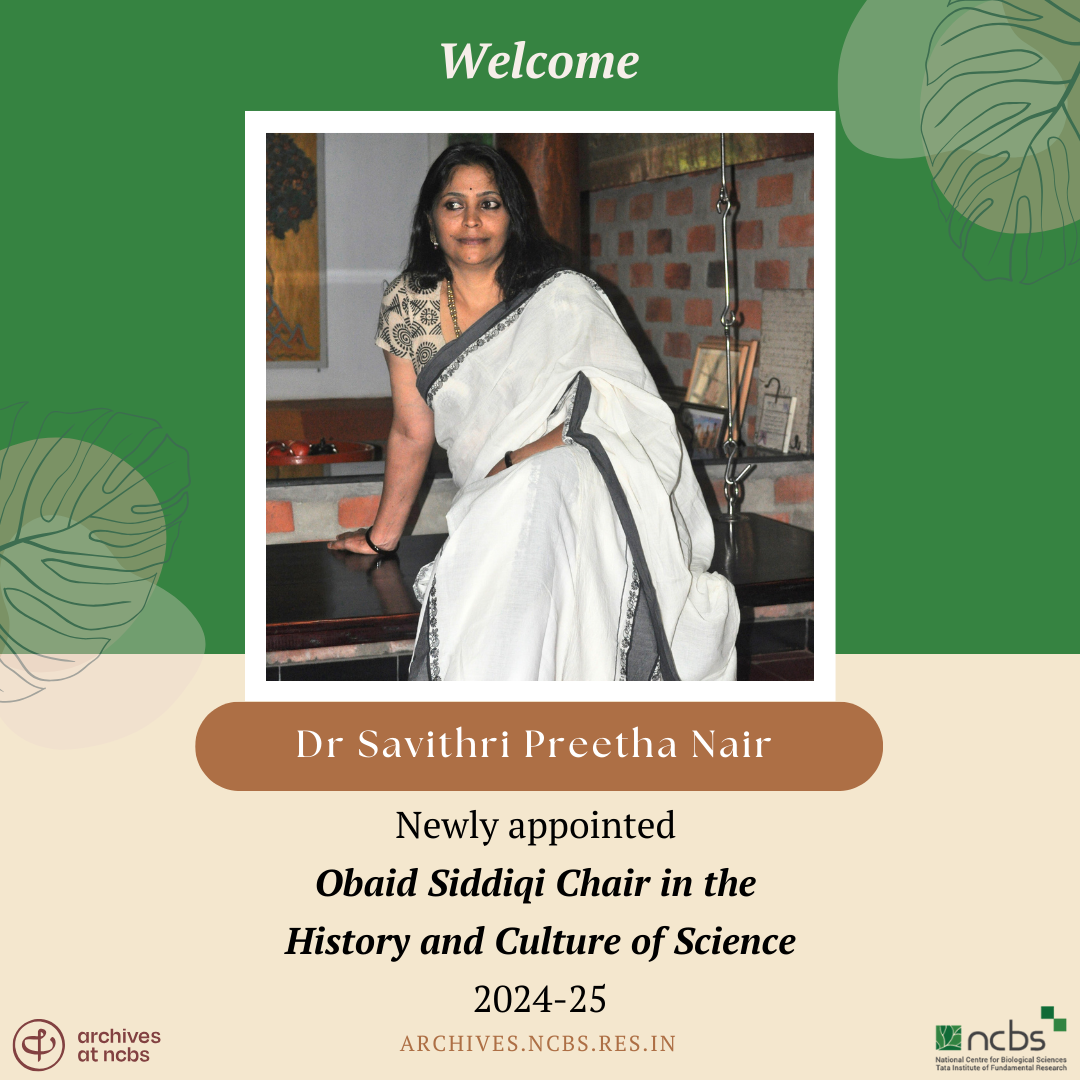The Obaid Siddiqi Chair in the History and Culture of Science at the Archives at NCBS is an effort to bridge the gap between Science, Social Science and Humanities, and foster a community of academics across disciplines. The Obaid Siddiqi Chair is awarded to eminent scholars whose work stretches across disciplines, deepening our understanding of the history and culture of science. The Obaid Siddiqi Chair and several research activities of the Archives at NCBS are made possible through a grant from the TNQ Foundation.
Dr Savithri Preetha Nair has been appointed the fourth Obaid Siddiqi Chair, for the academic year, 2024-2025. Nair is a historian and philosopher of science.
Her work has been transdisciplinary and primarily examines the material culture of doing science: it focuses on where, and how, scientists manipulate material, how they tinker and craft, and forge networks with non-scientists, to produce science, at the micro-historical and global levels. She is curious about what goes on in the border zones of the laboratory, the field, and the museum, and is partial, from the point of view of study, to what she calls small science/backyard science or slow science, as against “big science.” Almost all of Nair’s research projects have revolved around “finds”; she has explored several repositories in India and the world as part of her intellectual journey.
“My focus has been on the role of human and non-human agencies in the making of scientific knowledge, on science in practice, and knowledge in transit,” says Dr Nair. “It’s been on how and why objects, ideas, people and knowledge move, travel, circulate or migrate, locally and globally, in colonial and post-colonial settings, India in particular.”
Born in Kerala, Nair had her early education in the cities of Bangalore, Trivandrum and Baroda in a wide range of disciplines, from economics to art history. In 2003, she earned her doctorate from the School of Oriental and African Studies (SOAS), the University of London, UK. The focus of her dissertation was on collecting for science and the colonial museum as a hybrid site of knowledge production. One of the chapters in her dissertation evolved to become her first monograph in 2012, Raja Serfoji II: Science, Medicine and Enlightenment in Tanjore. Following that, a three-year post-doctoral project based at SOAS and the British Library, London, led to the co-authored (with Richard Axelby) reference volume, Science and the Changing Environment in India 1780-1920: A Guide to Sources in the India Office Collections (2010).
Presently, Nair is engaged in what she describes as “a major recovery project of Indian women in science”. One of the first products of this strand of her scholarship is the recent book, Chromosome Woman, Nomad Scientist: E. K. Janaki Ammal, A Life: 1897-1984 (2022). She is also studying South Asian plant compendia from across centuries, to produce a series of meditations on the “wild” and the “cultivated.” As an extension of this research, she hopes to investigate the history and culture of rice in India, and curate public exhibitions highlighting her research on South Asian plant compendia. As part of this strand of work, she plans to study the Leslie Coleman Papers at the Archives at NCBS, with the objective to shed light on the connection between biological agency, knowledge production and economic enterprise in the context of 20th-century Mysore State. She aims to continue her project of Indian women in science as the Obaid Siddiqi Chair at the NCBS and present parts of her work in the form of public lectures.
“Faculty and students of NCBS are looking forward to having Dr Savithri Preetha Nair on campus as the fourth Obaid Siddiqi Chair,” said Prof LS Shashidhara, Director, NCBS-TIFR. “Her presence will help us connect science, history, culture and society and help us view our work from a new transdisciplinary perspective. We are grateful to TNQ Foundation for its generous support to establish the Obaid Siddiqi Chair.”









0 Comments